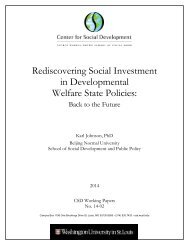Exploring and Assessing Intercultural Competence - Center for ...
Exploring and Assessing Intercultural Competence - Center for ...
Exploring and Assessing Intercultural Competence - Center for ...
Create successful ePaper yourself
Turn your PDF publications into a flip-book with our unique Google optimized e-Paper software.
<strong>Exploring</strong> <strong>and</strong> <strong>Assessing</strong> <strong>Intercultural</strong> <strong>Competence</strong><br />
(FEMS1+SFs)<br />
- noted two sides of life (unstructured life of street children/structured life of volunteers)<br />
- respect<br />
- tolerate differences as got to know <strong>for</strong>eign volunteers<br />
(FEMS1+I)<br />
- “Contact with people from other cultures . . . is an opportunity to meet new people, develop<br />
myself, <strong>and</strong> learn from the volunteers who have different points of view.”<br />
(FEMS3+I)<br />
- learned about communication<br />
- strengthened relationships I had due to contact with Vs<br />
(FEMS3+I)<br />
- “Sharing a new culture is important. While working with volunteers, I constantly learn to<br />
collaborate with them <strong>and</strong> this helps me to work better. This also helps me to know them<br />
(<strong>for</strong>eigners) better <strong>and</strong> be more open to them. There are some (customs) that volunteers don’t<br />
share (with us since) they haven’t lived our reality. As they get to know this reality better<br />
(through language), they tend to adapt better to this situation.”<br />
(FEMS4+I)<br />
- “This experience has helped me to recognize many differences between our cultures <strong>and</strong> theirs:<br />
the way they live, the way they dress, <strong>and</strong> the things they eat. I find (the volunteer) also very<br />
curious about other cultures. She told me this experience has made her want to travel <strong>and</strong> get to<br />
know other cultures on a deeper level.”<br />
(FEMS5+I)<br />
- “This contact has allowed me to underst<strong>and</strong> volunteers better <strong>and</strong> to become friends with them.<br />
Outside the work environment, I have become more open.”<br />
(FEMS5)<br />
- learned from contact with Vs<br />
- became more underst<strong>and</strong>ing<br />
- more open<br />
- more tolerant<br />
- has helped me with my daily tasks<br />
Summary<br />
<strong>Intercultural</strong> research generally focuses on the sojourner – on those traveling to a new<br />
environment. However, their presence among their hosts most certainly must also have some<br />
effect on people they interact with. It is clear in this case that the monolingual-monocultural<br />
mentors have been challenged through this IC contact even while remaining at home. As a result,<br />
they too have grown although perhaps not in all the same ways (e.g., language) nor to the same<br />
degree.<br />
Mentors specifically cite the following effects on themselves:<br />
- derived insights by comparing<br />
- developed respect<br />
- opportunity to meet new people / develop relationships (2)<br />
<strong>Center</strong> <strong>for</strong> Social Development<br />
Washington University in St. Louis<br />
57
















